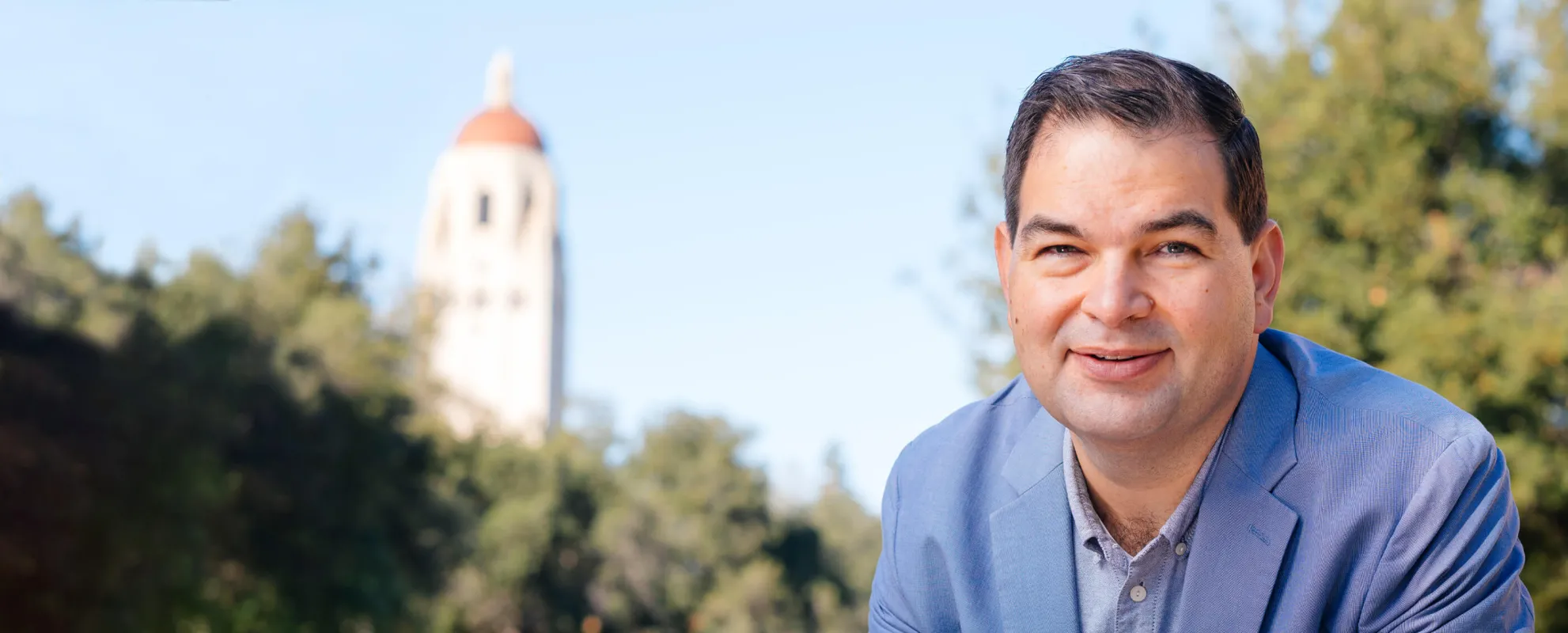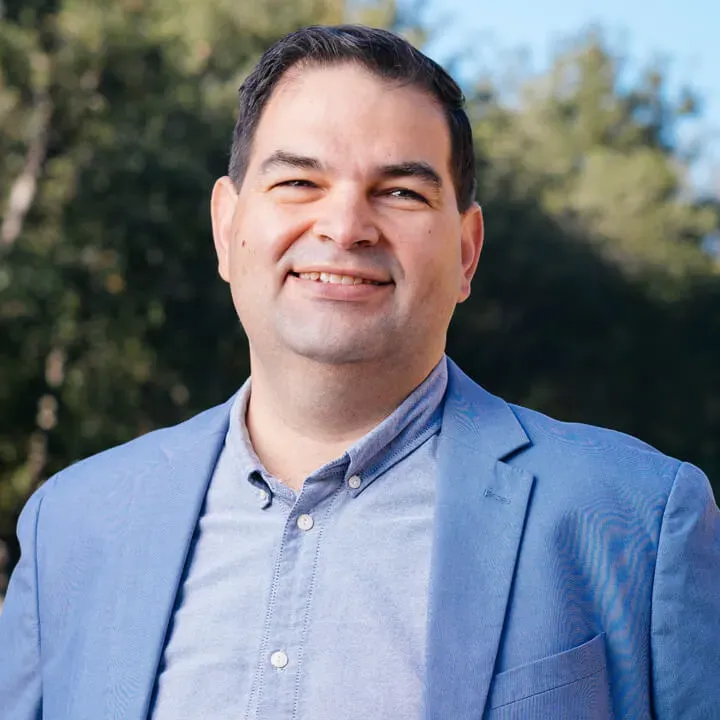Whatever image you have of a typical career military officer, David Vernal probably doesn’t fit it.
An “unabashed nerd” who adored comic books and Japanese cartoons as a kid, he chose to major in East Asian Studies at Harvard so he could immerse himself in Japanese pop culture. A more typical route might have taken him to graduate school and a life as an academic; instead, a few months after leaving Cambridge, he was at officer training school at Maxwell Air Force Base in Alabama. After struggling to adapt to military life in those first few months, Vernal found his footing and went on to a decorated career working at the highest levels of intelligence gathering and cybersecurity.
A first-generation immigrant — his parents moved from Chile to the UK and then to New York state — Vernal found both meaning and purpose in military service. “Once you see yourself in the American story, it’s a way of connecting to it at a national level,” he says. “It’s a fairly common immigrant experience to attach yourself to the national mission.”
Vernal had deployments around the world, including in places where active military operations were underway. He commanded an intelligence squadron in Germany; was part of the National Security Council team during the Obama administration; helped feed intel to officers in charge of the United States’ nuclear deterrent force; and was on the ground in Kuwait while America and its allies battled ISIS. He retired last year after nearly 27 years of service with the rank of colonel.
Now he is a member of the newest class of MSx students at Stanford GSB and eager to pivot toward his next challenge, whatever that turns out to be. “I thought that a year at the GSB and being part of the Stanford community would give me a whole new set of tools, especially because the program is so international and has such an incredible cohort,” he says. “I thought there was no better way to get a really broad view of very different careers and possibilities.”
How did you end up in the Air Force?
I enjoyed academics at Harvard, but I wasn’t focused on the next step. Unlike some of my savvier classmates, I wasn’t lining up internships during the summer. And it was a different time in terms of the help available for first-generation immigrants to navigate those systems in American culture. So, I was a wide-open slate at the time.
I was interested by this idea of ‘intelligence’, even though I didn’t know what it was. And I was fascinated by an institution that was so founded on group identity. What would it mean for someone like me, who was not an athlete and had never been a part of teams before? Part of my instinct was that I could try it out and then I could always get out after four years and go find my next job.
Were your family and friends surprised by your choice?
It was a radical departure from what my family would’ve expected. I got the offer, accepted, and then informed everyone that oh, by the way, in the fall I’m heading off to Montgomery, Alabama, to become an officer in the Air Force.
It must have been a shock to your system to suddenly be immersed in military culture.
Absolutely. I knew that it would be, but then you live it. My first military award was “most improved” which meant that I had gone from hopeless to possibly not a complete embarrassment. It was also an immersion in a broader American story than I had gotten in the Northeast. I had southern barbecue for the first time.
When did you know that the Air Force had been a good choice?
As a junior officer in my first 10 years, I was extremely lucky. The Air Force paid me to do something that I already loved, which was living overseas and learning in a foreign culture. When I was in intelligence officer training, I raised my hand and said, ‘I speak Japanese, is that useful?’ So, my first assignment was at Headquarters Fifth Air Force in Japan to be a liaison with the Japan Air Self-Defense Force. That’s where I started getting immersed in Air Force culture, really bonding with my fellow junior officers.
After a stint in England and in South Korea, you were accepted for the Olmsted Scholar Program. What is that, and what was your experience?
This is the coolest program possible because it takes a young officer and sends him or her overseas to study at a foreign university in the foreign language. You leave the warm embrace and structure of the military to navigate a foreign culture, foreign city, figure it out all on your own, and realize how differently systems can function in other countries. You’re still on active duty, but there to learn about yourself and think more broadly about how different parts of the world can be. I studied in Taiwan for two years, and the program includes a travel stipend, so I got the chance to travel throughout Southeast Asia — Thailand and Malaysia and Singapore and Vietnam. It was an amazing opportunity.
Was that the point when you decided to make the Air Force your career?
By accepting the Olmsted scholarship, you incur the commensurate active-duty service commitment afterwards, which of course makes sense. Fulfilling that was going to take me until year 12, and when you get to year 20 you’ve got retirement. So that’s how I sort of transitioned from somebody who was just enjoying each assignment to having a career path that was much clearer in front of me.
Some years later you were recruited to work on the National Security Council. What did you do there?
I was working for one of the first Air Force intelligence squadrons to support cyber operations. It was a period when the United States was reshaping its cyber operations policy. So much of the job is shepherding negotiations between agencies to come to consensus and then elevating the issues up to the president himself, if needed, to decide what the policy of the United States government shall be regarding X. I got to see a lot of that very up close. I still pinch myself that I had the chance to do that.
Cybersecurity has become a crucial part of not only military preparedness, but also the protection of national infrastructure. What are the challenges inherent in this work and how would you characterize the vulnerability that we face?
Previously, national security concerns were defined by threats that approached a nation-state at or beyond its borders. Now, because we’ve connected everything technologically — which has a lot of incredible benefits and value — it changes the nature of national security problems because that connectivity allows activities within your borders that don’t fit former models of what a nation-state could do. They can, for example, gather intelligence at scales unimaginable before, or, as we’ve seen in the last five years, conduct influence operations at scale.
You’ve got a whole series of novel questions that we haven’t had to deal with before. What if a ransomware gang based in Russia shuts down the business systems of a U.S. pipeline company? Practitioners look for antecedents and try to match them into previous situations [to develop response scenarios] but the truth is we haven’t confronted exactly this situation. Along with our partners in the international community, we are trying to figure out what those rules are, and what the threats and dangers are, and how do we, as a society, make sure that we’re resilient.
Now you’re back in school, looking for a new opportunity. What do you hope to gain from your time at the GSB?
I’m here to pivot. I have a deep understanding of things like the national security process and how the Air Force works, but there are all these things that have been going on for the last 20 years that I haven’t been a part of. I don’t know how a company works. I don’t know how to do a balance sheet or have the basic language and vocabulary of the business world. I’m incredibly grateful for my military career, but also for this MSx program because I’m getting those business basics. And I’m also seeing all the cool things that my classmates have done that had nothing to do with defense or national security.
The GSB attracts several military veterans each year. How do veterans enrich the social and intellectual life of the GSB?
As a general matter, they bring perspective. We dealt with very weighty issues, matters of consequence to the United States, and often issues literally of life and death. When you get out into the world and you are thinking about how your day is going, there’s always this sense of “well, I’m not being shot at right now.”
We also had a chance to know and work with young Americans from all backgrounds. When I was a commander, I suddenly had responsibility not just for the work performance, but for the health and welfare of more than 150 young Americans aged 18 and up. These are amazing responsibilities that go beyond just taking care of your team in a business setting, and you learn a lot about people. I saw some of the worst behaviors, but I also saw the amazing capacity of culture to create teams of very diverse individuals, give them common purpose, and have them achieve great things that they didn’t know they were capable of.
Photos by Elena Zhukova


